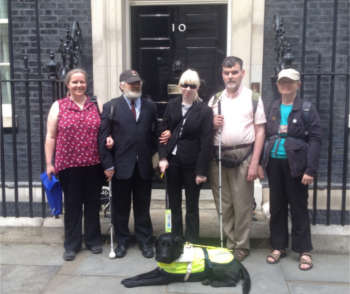Conservative peer and anti-shared space campaigner Lord Holmes and the National Federation of the Blind of the UK have petitioned Number 10 to launch a national inquiry into the legality of shared space schemes.
The move comes after campaigners suggested they had ‘concrete evidence’ from Freedom of Information requests to show that ‘misinformation is being provided on these schemes’.
The term shared space is used to cover a wide variety of schemes that remove street furniture, often taking out crossings, road markings and curbs on the principle it creates a safer road environment through raising awareness.
It has proven controversial due to claims that it excludes vulnerable road users, particularly the blind.
Lord Holmes told Transport Network there was a need for clear guidance on the issue, stating inclusivity must be a ‘golden thread’ at the heart of all planning issues.

Anti shared space campaigners take their fight back to No. 10
‘It seems extraordinary we need to argue about crossings,’ he said and reiterated calls for a moratorium on shared space until more is known about the safety impacts of such schemes.
Anti-shared space campaigner Sarah Gayton told Transport Network she strongly disputes figures around well-known shared spaces schemes such as Poynton, East Cheshire and Julian Road in Bath, including the numbers of road collisions that happened prior to the schemes and their impact on regeneration.
For instance, in CIHT’s Manual for Streets 2 (2010) it was reported that in the three years prior to Julian Road scheme being implemented in 2006, there were nine recorded serious accidents in the relevant area.
While in the 'Street Design for All - An update of national advice and good practice' it suggests there were five accidents in the area between 2002 and 2006.
However Ms Gayton claims that an FOI to the Bath and North East Somerset Council found there were only two serious incidents in the area in the eight years prior to the scheme being implemented.
On the 2012 scheme in Park Lane and Fountain Place in Poynton, designers Hamilton-Baillie Associates suggested there were 16 void shops in 2010, following its 2013 CIHT award for the scheme.
However a 2009 'Poynton Town Centre Study - Proposals for Public Realm Enhancements for Park Lane and Fountains Place' by Hamilton-Baillie Associates in Association with Arup stated: ‘There are few vacant units and Park Lane has the feel of a busy and reasonably successful shopping street, albeit catering predominantly for a low-budget, ‘captive’ local market. There is considerable street activity during the day, and pubs and restaurants maintain appreciable activity in the evenings.’
Ms Gayton said it was ‘highly unlikely' that the figure of 16 empty shops was accurate.
In correspondence seen by Transport Network, CIHT accepted that information accompanying the Poynton scheme could have been presented in a more consistent way, and that it would revise its guidance for future awards entrants to reflect the need for clearly identifying the source of information.
A spokesman added that it was usual practice to review processes after every awards.
Sue Percy, CIHT chief executive said: ‘CIHT is working with the Department for Transport, Lord Holmes and other organisations including the Equalities and Human Rights Commission on guidance on ‘Creating better streets: redefining shared space’ to assist the industry on this important issue.’
Anti-shared space campaigners recently received a blow after losing a court case on a Reading scheme, where the borough council switched off traffic lights in the St Mary's Butts, Broad Street, Oxford Road and West Street crossing in January 2015.
Simon Goodall, who represented ParalympicsGB at London 2012, argued that the decision by Reading council had placed him and other disabled people at risk.
Mr Goodall was seeking permission to bring a Judicial Review of the council's decision on the basis that the new arrangements discriminated against blind and partially sighted people.
However in June the judge refused to give permission for the case to proceed, reasoning that the steps taken by the council to consider the needs of blind and partially sighted people were sufficient.
Transport Network understands that Mr Goodall could take a disability discrimination case against Reading Borough Council in the county court.
Register now for full access
Register just once to get unrestricted, real-time coverage of the issues and challenges facing UK transport and highways engineers.
Full website content includes the latest news, exclusive commentary from leading industry figures and detailed topical analysis of the highways, transportation, environment and place-shaping sectors.
Use the link below to register your details for full, free access.
Already a registered? Login